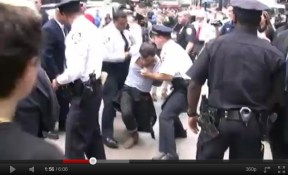What happens when you’re the de facto distribution platform for something like Occupy Wall St and other events that run afoul of the police? Well, you end up getting an email through semi-official channels saying “Would you please remove the video of Officer Pounder allegedly overstepping his authority” — and there’s not much of a choice. As much as Google would like to avoid antagonizing local police forces, the backlash that would occur if they forcibly took down, say, Officer Bologna (Tony Bologna no less) pepper spraying those girls, would be lethal to the YouTube brand. Up it stays.
On the other hand, there are plenty of legitimate takedown requests that come from governments when a video or other Google-hosted item is in fact illegal, so down they must come, whether they like it or not. It’s a fine line to walk, and Google has hoped to make their position clear with their Transparency Report. The report corresponding to the first half of 2011 has an interesting little extra tidbit: “We received a request from a local law enforcement agency to remove YouTube videos of police brutality, which we did not remove.”
Why so specific? The statement continues, saying that other videos of police were requested to be taken down for defamation reasons, and were also not removed. I think that in this time of turmoil, Google is saying very quietly what it wouldn’t really be tactful to say loudly: “Put your sensitive and controversial video data here.” Certainly a site like LiveLeak is also an option, but YouTube finds itself the center of attention more frequently, and being more of a popular culture community, it wants to emphasize its legitimacy in matters like this. The transparency report is a way for them to encourage users to trust them, and perhaps, governments to respect them.

The official or district that requested the brutality video be taken down is not specified (and at the level of disclosure Google seems to prefer, I doubt it ever will be), but it’s worth noting that it’s a “local” law enforcement agency. That is to say, Google did not receive a letter from a federal judge and decide to contest it. Hopefully this little display of gusto won’t be overpowered if the stakes get raised and that does happen. In the meantime, as I wrote, our responsibilities as documentarians of everything around us are increasing, and knowing YouTube is an asset we can trust is a good thing.
On a related note, the trends of takedowns aren’t really notable this year; though The Guardian points out that there was a 70% increase in takedown requests versus the previous six-month period (92 vs. 54), they neglect to note that the six-month period before that (i.e. January-June 2010) had a whopping 128. Google has started classifying takedown requests by reason, however (defamation, privacy, hate speech, etc), which will be an interesting set of data to track.
US Government requests for user data jumped, however: 5950 versus 4287 during the same period in 2010, asking for information on 11,057 users. 93% of these were complied with, “fully or partially.” So while they’re making something of a stand on removing data, they don’t seem to have any trouble giving it out.
